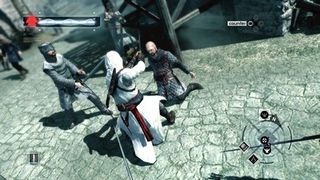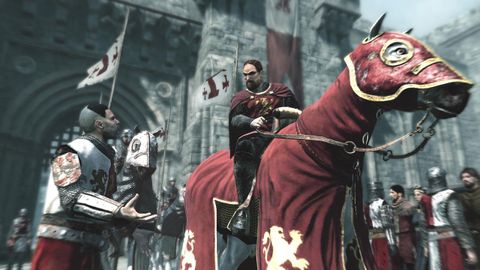There are times when Assassin’s Creed feels like the future of videogames. It plays with heavy ideas and spectacular technology. It flits between questions on the nature of reality, and slapstick ragdoll animations of medieval goons plummeting to their death. Yet there are also times when it feels like a huffing anachronism: a failure where the writing overrides play, and the rigorous structure overrides the player’s instinct to explore and experiment. A game in which the high concept actively prevents you from grasping the fun. For its unparalleled highs, Assassin’s deserves praise and more: it deserves to be played. For the times when it falls flat on its face, Assassin’s should be pointed and laughed at. And perhaps poked with a stick.

The high concept, then: you are Altair, an assassin stalking medieval Jerusalem, Acre and Damascus, knocking off high-profile leaders from both Richard the Lionheart’s and Saladin’s Middle Eastern campaigns. Each target must first be traced, enquiries made, and witnesses interrogated, before the hit takes place. Some will be quietly knocked off: a slip of a dagger into an exposed back. Some will be messily slaughtered, after thrilling chases through cramped streets. Success comes from the willingness to adapt, and to utilize your surroundings. Altair is exceptionally nimble, able to clamber over the skyline, race up vertical walls, and blend into milling crowds.
But the high concept doesn’t end there. You are also Desmond, in the near future, a direct descendent of Altair, reliving memories embedded in your genome through virtual reality and a sophisticated dentist’s chair called the Animus. In the future, Desmond has been kidnapped by modern Templars, who believe somewhere in his DNA lies the location of a mystical blah blah blah spoilers etc.
One question has to be asked before we get to the meat of the game: why this tension between historical caper and science-fiction mystery? The first answer: to better create relevance. This is a brave game that offers perspective on today’s hot-button issues: fanaticism, control, faith and nihilism. In the game’s version of the Holy Land, Christian, Muslim and agnostic are equally flawed, equally corrupt, equally stubborn, and equally liable. Creed asserts its relevance by providing a direct link from the events of yesterday, to the troubles of tomorrow. Brave, but flawed.
There is an issue with all the moralizing: it’s played out as a series of lectures from the recently deceased. As they lie dying, they’ll chat with Altair about the causes of the conflict and the nature of reality like pretentious college freshmen. Way to ruin the moment: the high of the kill followed by dreary philosophy. There’s another reason for the science-fiction: it provides the designers with a get-out clause for some ill-considered game restrictions. Not allowed to enter the old town of Jerusalem? Use the ‘MEMORY NOT AVAILABLE’ blue screen. Need a reason for Altair to climb the steeples and churches? How about the need to ‘synchronize’ your memories with those of your ancestors? Naughty player going round stabbing civilians in the throat? Tell them that behavior not consistent with their ancestor destabilizes their connection to the Animus. This over-elaborate fiction is a solution to an unnecessary problem.
Once you’re through the science and into the medieval simulation, Assassin’s Creed can feel like a game without peer. It’s a remarkable joining of technology and art. The cities go on and on, each distinct, each becoming familiar as you play. The draw distance feels infinite; you’re able to pick out landmarks from miles away. Steeples tempt you to climb them. Markets draw you in with their thriving crowds.

